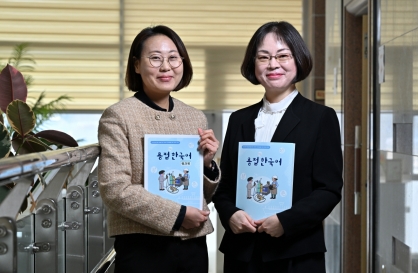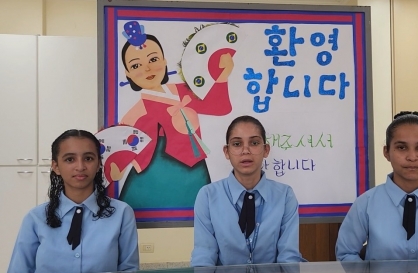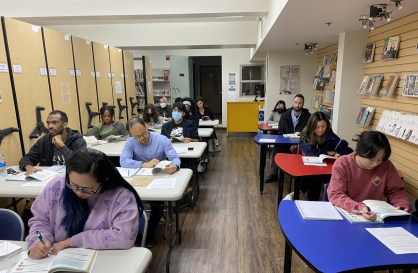Most Popular
Hello Hangeul
-
1
Welding book first in vocational Korean series for foreign labor

-
2
[Korea Beyond Korea] In Sao Paulo, horizons expand for Korean studies
![[Korea Beyond Korea] In Sao Paulo, horizons expand for Korean studies](//res.heraldm.com/phpwas/restmb_idxmake.php?idx=644&simg=/content/image/2023/11/20/20231120000619_0.jpg&u=20231206104853)
-
3
In Brasilia, worldly dreams are born from Korean classes

-
4
Americans seeking to visit Korea learn the language in LA

-
5
[Korea Beyond Korea] Berlin, Europe's Korean Studies hub, nurtures next-gen experts, scholars
![[Korea Beyond Korea] Berlin, Europe's Korean Studies hub, nurtures next-gen experts, scholars](//res.heraldm.com/phpwas/restmb_idxmake.php?idx=644&simg=/content/image/2023/10/18/20231018000929_0.jpg&u=20231023154735)
[Hello Hangeul] 'Korean language programs thriving, but impact analysis missing'
Singapore National University professor Chi Seo-won says knowing what path learners take after completing education is crucial for enhancing Korean language education
By Jung Min-kyungPublished : Aug. 22, 2023 - 09:46

The Korean government is responding fairly well to the growing global demand of Korean language education, through its expansive network of King Sejong Institute branches and sending out instructors.
But given that these efforts are funded by Korean taxpayers’ money, the country should maintain a comprehensive oversight of their outcomes, such as tracking the career trajectories of learners after completing their Korean language education, said National University of Singapore professor Chi Seo-won.
“Understanding the goals of learners is crucial,” in designing any educational programs, stressed Chi in a phone interview with The Korea Herald.
The authorities funding education programs but not keeping track of their impact on participants’ life paths are missing a chance to elevate the programs to a higher level, she added.
Chi also stressed that political support plays a role in establishing a sustainable infrastructure for Korean language education in foreign countries.
Below are edited excerpts from the interview.
Q. What do you think are the most important tasks in Korean language education around the world or in your region, and why do you think so?
It is crucial to know why Korean learners want to learn the language in the first place.
The government-funded King Sejong Institute is doing really well to the point where I believe it stands on par with China's Confucius Institute or the UK's British Council. A large number of Korean instructors are being dispatched overseas to meet the high demand for Korean education and they are well-qualified.
However, I wish there was a more solid system to oversee various projects that are funded with taxpayers’ money.
One of the most important things to do is to know and keep track of what learners choose to do with their knowledge of the Korean language and culture along their career path.
In Singapore, for instance, the government gives grants to overseas students, but that money comes with some strings attached, including having to work for a certain period of time in Singapore.
Promoting the globalization of Korean language is good, but for it to continue in the long term and bring the benefit to the country, we need a solid system to oversee projects.
Q. Hallyu is undoubtedly among the main factors that drove the rapid increase in demand for learning Korean. What should the Korean government, universities or related institutions work on to keep the Korean language in demand, without the help of Hallyu?
For global interest to continue, we should focus on future generations.
Also, a certain level of political support is desirable.
Before Thailand officially incorporated Korean language into its regular school curriculum, there were exchanges between government officials and politicians from both countries.
Q. How do you think the eduational technology industry can help the qualitative growth of Korean language education around the world?
There are so many parts of Korean language textbooks that have yet to be digitalized. Other language textbooks allow learners to download e-textbooks on Kindle and provide educational video clips online. But many Korean language textbooks are still offered in hard copy. We have a long way to go.
This is part of The Korea Herald’s “Hello Hangeul” project which consists of interviews, in-depth analyses, videos and various other forms of content that shed light on the stories of people who are learning the Korean language and the correlation between Korea’s soft power and the rise of its language within the league of world languages. – Ed.













![[Korea Beyond Korea] In Sao Paulo, horizons expand for Korean studies](http://res.heraldm.com/phpwas/restmb_idxmake.php?idx=644&simg=/content/image/2023/11/20/20231120000619_0.jpg&u=20231206104853)


![[Korea Beyond Korea] Berlin, Europe's Korean Studies hub, nurtures next-gen experts, scholars](http://res.heraldm.com/phpwas/restmb_idxmake.php?idx=644&simg=/content/image/2023/10/18/20231018000929_0.jpg&u=20231023154735)







![[Today’s K-pop] Treasure to publish magazine for debut anniversary](http://res.heraldm.com/phpwas/restmb_idxmake.php?idx=642&simg=/content/image/2024/07/26/20240726050551_0.jpg&u=)